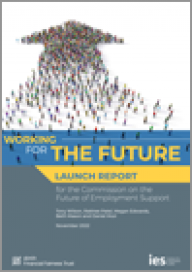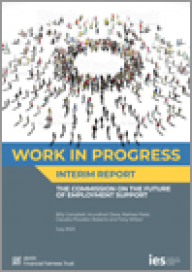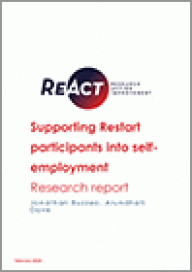Publications
 We author and publish a range of resources to keep you up to date with the latest developments in employment, labour market and human resource policy and practice.
We author and publish a range of resources to keep you up to date with the latest developments in employment, labour market and human resource policy and practice.
All our pdf publications are free to access.
Search results
-
📄
Measuring Soft Outcomes and Distance Travelled: A Review of Current Practice
Dewson S, Eccles J, Tackey N D, Jackson A | Jul 2000 | Department for Education and EmploymentMonitoring systems for employment programmes targeting unemployed people have traditionally focused on 'hard', quantitative outcomes such as the numbers going into jobs or gaining qualifications. However, it is often both unlikely and inappropriate for projects to expect to achieve 'hard' outcomes from target groups that are facing multiple barriers to employment. IES was commissioned to look at the use of 'soft', qualitative outcomes on projects funded by the European Social Fund (ESF).
-

What works in youth employment partnerships
A guide to improve practice and case study collection
Orlando C | Jun 2021 | Institute for Employment StudiesThe 'What Works in Youth Employment Partnerships’ guide and case study collection are the first outputs from a three-year Health Foundation-funded project led by IES on improving access to good quality work for young people.
-

Working for the Future: Launch report for the Commission on the Future of Employment Support
Wilson T, Patel R, Edwards M, Mason B, Muir D | Nov 2022 | Institute for Employment StudiesThis report launches a new Commission on the Future of Employment Support, which IES is providing the secretariat for and is being funded by abrdn Financial Fairness Trust.
-

The Central London Works evaluation
Alexander K, Buzzeo J, Fox H, Williams C, Wilson T, Cook J | Jun 2022 | Institute for Employment StudiesThese reports cover the evaluation of the Central London Works (CLW) which aimed to help individuals who faced barriers to work to find and sustain good quality employment.
-

Supporting Highly Qualified Participants: Exploring Routes to Success
Kramers E, Fox H, Mason D and Mansour J | Feb 2025 | Institute for Employment StudiesThis research explores how highly qualified and experienced participants are supported by Restart, what is working across a range of approaches, and identifies recommendations for improving the quality of service to individuals in this cohort.
-

Work in Progress: Interim report of the Commission on the Future of Employment Support
Campbell B, Dave A, Patel R, Plowden Roberts C, Wilson T | Jul 2023 | Institute for Employment StudiesThis report presents findings from the first six months of the Commission’s work, comprising a major Call for Evidence that received around one hundred responses; twenty consultation events, workshops and focus groups; and an extensive review of the literature around ‘what works’ in employment support.
-

Building opportunity
How social housing can support skills, talent and workforce development
Alexander K, Evans S, Wilson T | Dec 2022 | Institute for Employment StudiesThis report looks at how we can raise employment and address labour market disadvantage for people living in social housing.
-

Supporting Restart participants into self-employment
Research report
Buzzeo J, Dave A | Mar 2024 | Institute for Employment StudiesThis report covers the ReAct research into support for Restart participants into self-employment and identifies the gaps and improvements that could be made.
-
📄
European Restructuring Monitor Quarterly - 2011, Issue 3
Hurley J, Riso S, Salvatore L, Rinawi M, Broughton A | Sep 2011 | European Foundation for the Improvement of Living and Working ConditionsThe economic situation continued to be dominated by sovereign debt problems in the eurozone countries. As these continued to remain unresolved, general sentiment had turned negative amid fears of a new second phase of the Great Recession of 2008–9. Growth outlooks in the developed economies had recently been scaled back with below trend growth forecast for 2011–12. Austerity programmes, which had begun to negatively impact public employment, especially in local and central government administrations, had not thus far been accompanied by the hoped-for handover from public to private demand. Within the EU, there were a number of different labour market stories reflecting very different trajectories during and after the 2008–9 crisis. Unemployment in Spain and Ireland continued to rise while other countries severely affected by the crisis – notably the Baltic states – showed signs of a strong recovery. The German unemployment rate was at its lowest level in nearly twenty years (6%) despite a recent easing of growth while the UK unemployment rates were at an eighteen-year high (8.1%). Meanwhile in Greece unemployment had risen by 4 percentage points in the last twelve months.
-
📄
European Restructuring Monitor Quarterly - 2011, Issue 1
Hurley J, Riso S, Salvatore L, Miginis M, Parker J, Broughton A | Apr 2011 | European Foundation for the Improvement of Living and Working ConditionsIn this edition of the ERM quarterly, we describe some positive recent developments in the IT sector where looming skill shortages were more of a concern than unemployment. We also showcase a potentially interesting industrial restructuring project at the old Fiat plant at Termini Imerese in Sicily.
